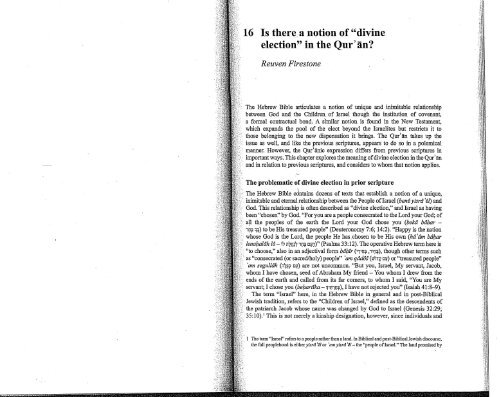reynolds-the-quran-in-its-historical-context-2
reynolds-the-quran-in-its-historical-context-2
reynolds-the-quran-in-its-historical-context-2
Create successful ePaper yourself
Turn your PDF publications into a flip-book with our unique Google optimized e-Paper software.
Is <strong>the</strong>re a notion of "div<strong>in</strong>eelection'' <strong>in</strong> <strong>the</strong> Qur' an?Reuven FirestoneThe Hebrew Bible articulates a notion of unique and <strong>in</strong>imitable relationshipbetween God and <strong>the</strong> Children_ of Israel though <strong>the</strong> <strong>in</strong>stitution of covenant,a formal contractual bond. A similar notion is found <strong>in</strong> <strong>the</strong> New Testament,which expands <strong>the</strong> pool of <strong>the</strong> elect beyond <strong>the</strong> Israelites but restricts it tothose belong<strong>in</strong>g to <strong>the</strong> new dispensation it br<strong>in</strong>gs. The Qur' i<strong>in</strong> takes up <strong>the</strong>issue as well, and like <strong>the</strong> previous scriptures, appears to do so <strong>in</strong> a polemicalmanner. However, <strong>the</strong> Qur'i<strong>in</strong>ic expression differs from previous scriptures <strong>in</strong>important ways. This chapter explores <strong>the</strong> mean<strong>in</strong>g of div<strong>in</strong>e election <strong>in</strong> <strong>the</strong> Qur' anand <strong>in</strong> relation to previous scriptures, and considers to whom that notion applies.The problematic of div<strong>in</strong>e election <strong>in</strong> prior scriptureThe Hebrew Bible cdnta<strong>in</strong>s dozens of texts that establish a notion of a unique,<strong>in</strong>imitable and eternal relationship between <strong>the</strong> People oflsrael (bene yisra 'el) andGod. This relationship is often described as "div<strong>in</strong>e election," and Israel as hav<strong>in</strong>gbeen "chosen" by God. "For you are a people consecrated to <strong>the</strong> Lord your God; ofall <strong>the</strong> peoples of <strong>the</strong> earth <strong>the</strong> Lord your God chose you (bekii bal;zar -1!Ji11il) to be His.treasured people" (Deuteronomy 7:6; 14:2). "Happy is <strong>the</strong>-nation·. whose God is <strong>the</strong> Lord, <strong>the</strong> people He has.chosen to be His own (hci'tim bal;zar/enal;zaltih !6 -i7 n?t!J'I 10il t:l\lv)" (Psalms 33:12). The operative Hebrew term here is"to choose," also <strong>in</strong> an adjectival form bal;zfr ('1'1Jil ,1'1Ji!), though o<strong>the</strong>r terms suchas "consecrated (or sacred/holy) people" 'am qtid6§ (tzii1i? Ol!) or "treasured people"'am segulltih (n?~Q Ol!) are not uncommon. "But you, Israel, My servant, Jacob,whom I have chosen, seed of Abraham My friend- You whom I drew from <strong>the</strong>ends of <strong>the</strong> earth and called from <strong>its</strong> far comers, to whom I said, "You are Myservant; I chose you (bel;zartfka -';J'IJ11Jil), I have not rejected you" (Isaiah 41 :8-9).The term "Israel" here, <strong>in</strong> <strong>the</strong> Hebrew Bible <strong>in</strong> general and <strong>in</strong> post-Biblical. · Jewish tradition, refers to <strong>the</strong> "Children of Israel," def<strong>in</strong>ed as <strong>the</strong> descendents of<strong>the</strong> patriarch Jacob whose name was changed by God to Israel (Genesis 32:29;35:10). 1 This is not merely a k<strong>in</strong>ship designation, however, s<strong>in</strong>ce <strong>in</strong>dividuals andThe term "Israel" refers to a people ra<strong>the</strong>r than a land. In Biblical and post-Biblical Jewish discourse,<strong>the</strong> full peoplehood is ei<strong>the</strong>r yisrd 'el or 'am yisrd 'IH- <strong>the</strong> "people oflsraeL" The land promised by


